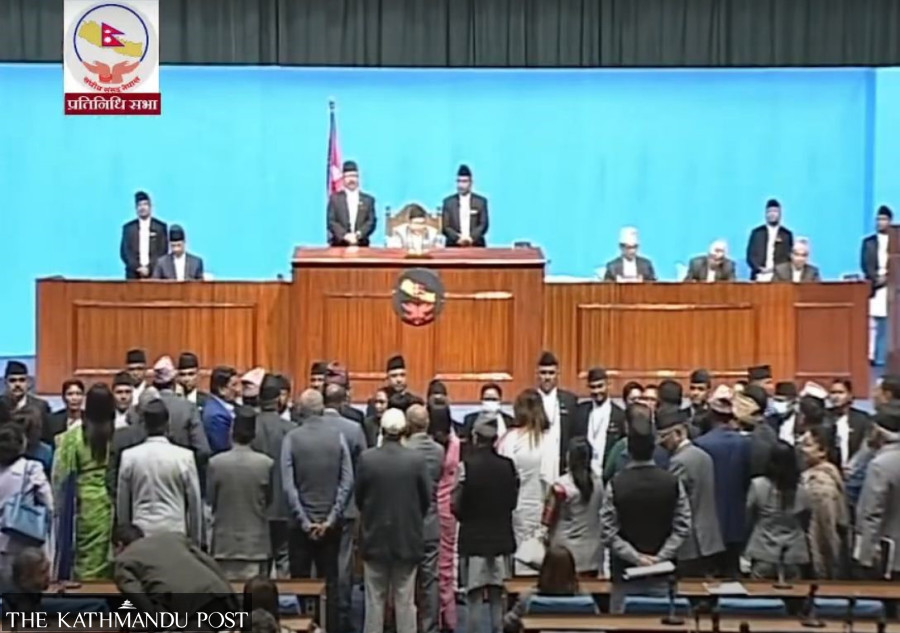Columns
Congress’s gamble against Rabi
The NC’s obstruction of Parliament and muzzling of Lamichhane will not help get their votes back.
Naresh Koirala
For weeks now, the Nepali Congress (NC) has been demanding that Home Minister Rabi Lamichhane resign or be investigated by a parliamentary committee for his alleged involvement in embezzling funds from a cooperative, even as the government continues to defend him. On March 27, Basant Kunwar, the Inspector General of Nepal Police, said that a complaint regarding the matter had been logged, but their investigation yielded no evidence, falling outside the preview of the law (Onlinekhabar, March 27, 2024). The NC argued Kunwar’s comments could not be relied upon because he reports to the home ministry.
The NC also rejected Lamichhane’s offer to address Parliament and answer their concerns. In response, Swarnim Wagle, a Rastriya Swatantra Party (RSP) lawmaker, challenged all political parties to support a "grand public inquiry” into all corruption cases, including in the cooperatives. No wonder none of the major parties took his bait. They are all believed to have been parties to several major past corruption cases. Having failed to resolve the impasse, the Speaker on April 14 prorogued the winter session of Parliament.
Obstruction of proceedings
Halting the parliament has become a routine in our political culture. When in opposition, the CPN-UML used obstruction as its primary tool to oppose the government. The party obstructed the house for eight months, between September 2021 and May 2022, because the Speaker refused their demand to revoke the membership of 14 lawmakers who had defected from the UML. In May last year, the UML obstructed the House protesting an allegation by a lawmaker that the party chair, KP Sharma Oli, was involved in a corruption scandal.
The NC is in the business now just because the government didn’t concede to their demand. Sharp disagreements between the government and the opposition are common in every democracy. Take the schism between the Republicans and the Democrats in the United States Congress. Despite the differences, the parties let the process work. In extreme cases, the opposition may walk out of Congress for a short period, but blocking the proceedings and suspending the House for an extended period is unheard of.
Lamichhanne’s financial past is known to be murky and questionable. IGP Kunwar’s comments notwithstanding, a recent report from the Nepal Police’s Rupandehi District Office implicated Lamichhane in a scandal of unpaid loan from the Supreme Saving and Credit Cooperative in Butwal. It is within the NC’s rights to ask for an investigation into Lamichhane’s dealings. However, there are other options to force the investigation than obstructing Parliament.
Since Prime Minister Pushpa Kamal Dahal brought Lamichhane to the cabinet, it would have been more sensible for the NC to go after Dahal than Lamichhane. The concern with conflict of interest could be addressed by requiring Lamichanne to recuse himself from the investigation and by ensuring his separation from the investigation is diligently followed.
Parliamentary debates are key to the legislative process. To ensure that the debates happen without fear of prosecution, every MP is endowed with the privilege of freedom of speech, which guarantees his/her complete immunity from prosecution or civil liability for any comment he/she makes in Parliament. Considering this, obstructions by the NC and the UML are profoundly unparliamentary.
Consequences
The RSP came into existence because of the non-performance of the older parties and the widely held belief that politicians in old parties are involved in pervasive corruption. The party’s anti-corruption and efficient public service delivery agenda made it the fastest-growing political party in the country. All three major parties lost their votes in the last election, but the NC lost almost 11 percent, according to a long-time NC leader, Arjun Narshing KC. Most of the support for the RSP came from traditional NC voters.
The newbie claims to have joined the government on the condition that it be allowed to work on its agenda without any interference. On March 13, Swarnim Wagle said his party would withdraw from the government if it failed to deliver. Lamichhane has already taken steps to resurrect some of the old corruption cases buried by the previous governments before a satisfactory conclusion. If these investigations continue, they will likely attract senior leaders of all three major parties.
As the investigation proceeds, the prime minister will come under intense pressure from the UML and the NC leadership to intervene and terminate the investigation. If he does not intervene and the RSP delivers its agenda even partially, voters will see them as a better option than older parties. The non-intervention will be beneficial for the RSP. Even an intervention will work. If the prime minister intervenes, the RSP will accuse him of creating hurdles in its pursuit of corruption and leave the government. They will go to the next election with “anti-corruption investigations obstructed by the older parties” as their main slogan—a vote catcher for people fed up with political corruption! The RSP is in a win-win position as long as it does not waver from its present anti-corruption and service delivery agenda.
Joining the government on the condition of delivering their agenda was a clever move by the RSP. Whether Dahal intervenes or not, it will work in RSP’s favour. The NC’s obstruction of Parliament and muzzling of Lamichhane is indefensible and will not get their votes back. The NC had already lost its image as a party anchored in democratic ideals and political integrity. By blocking Parliament, it has diminished further.




 20.12°C Kathmandu
20.12°C Kathmandu















